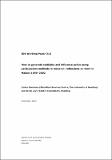| dc.contributor.author | Barahona, Carlos | |
| dc.contributor.author | Levy, Sarah | |
| dc.coverage.spatial | Malawi | en_GB |
| dc.date.accessioned | 2014-06-10T15:22:05Z | |
| dc.date.available | 2014-06-10T15:22:05Z | |
| dc.date.issued | 2003 | |
| dc.identifier.citation | Barahona, C. & S. Levy (2003) How to generate statistics and influence policy using participatory methods in research : reflections on work in Malawi, 1999-2002. Working paper series, 212. Brighton: IDS. | en_GB |
| dc.identifier.uri | https://opendocs.ids.ac.uk/opendocs/handle/20.500.12413/4007 | |
| dc.description.abstract | In Malawi in 1999–2002 we conducted research studies using participatory methods to generate population estimates; estimates of the proportion of people in a population with certain characteristics (e.g. the very food insecure); and estimates of the proportion of people in a population that should be targeted by an intervention. We claim that the statistics generated in these studies are at least as reliable as statistics obtained from traditional methods such as surveys.
A key requirement is to produce results from a representative sample, which can be generalised in order to reach conclusions for the population of interest. This implies working in a larger number of sites than is common for most studies that use participatory methods. However, we argue that the Malawi experience shows that it is possible to organise such studies at a reasonable cost.
Other key requirements are for the study design to incorporate statistical principles; and for PRA tools to be adapted to meet the demands of standardisation and comparability of data produced across sites. We argue that this can be done without undermining participatory approaches, behaviours and methods. If research studies using participatory methods follow this approach, the data generated will be suitable for standard statistical analysis. The statistics produced by such studies should be capable of informing policy at national level. However, there are some concerns about empowerment and ethical issues, which present challenges for the future. | en_GB |
| dc.language.iso | en | en_GB |
| dc.publisher | IDS | en_GB |
| dc.relation.ispartofseries | IDS working papers;211 | |
| dc.rights.uri | http://www.ids.ac.uk/files/dmfile/IDSOpenDocsStandardTermsOfUse.pdf | en_GB |
| dc.subject | Development Policy | en_GB |
| dc.subject | Participation | en_GB |
| dc.subject | Population | en_GB |
| dc.title | How to generate statistics and influence policy using participatory methods in research : reflections on work in Malawi, 1999-2002 | en_GB |
| dc.type | IDS Working Paper | en_GB |
| dc.rights.holder | Institute of Development Studies | en_GB |
| dc.identifier.koha | 145067 | |

